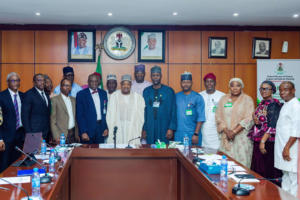Mandate of the Macroeconomic Department
The core mandates of the Macroeconomic Analysis Department are as follows:
- Coordinate the preparation of Long and Medium-Term Development Plans and provide guidance/support for the development plans at sector and subnational level;
- Coordinate the mid and end-term reviews of national development plans;
- Serve as a focal point for the coordination of Departments of Planning Research and Statistics (PRS) of MDAs;
- Coordinate the preparation of macroeconomic framework for the Long-, Medium- and Short-term development plans;
- Conduct Economic Policy Analysis and provide consistent Forecast of Macroeconomic aggregates for the preparation of Plans, Budgets, and National Debt Sustainability Analysis Report;
- Work closely with the Budget Office to determine and agree on the Size of the Capital Budget/MTEF, its Sectoral Composition, and Allocation Ceilings to MDAs. The purpose is to ensure that the annual budget does deviate from the National Development Plan. It is also meant to ensure that short-term economic shocks are identified and properly captured in the annual budgets;
- Conduct surveillance on the economy on a regular basis and produce reports on the performance of the economy on a half-yearly and annual basis;
- Conduct collaborative and in-house research studies on topical and contemporary socio-economic issues in the Nigerian economy;
- Serve as a Focal Point for the coordination of World Bank/IMF, AU, ECOWAS and AfDB related activities;
- Accompany the HM to IMF-World Spring Meetings, UNGA, and World Economic Forum (WEF);
- Serve as Public Sector Secretariat for the co-hosting of the Annual Nigerian Economic Summit with the Nigerian Economic Summit Group (NESG);
- Support the HM at the Economic Management Team (EMT) meetings;
- Support the Budget Office in the preparation of the Medium-Term Expenditure Framework (MTEF), Medium Term Sector Strategies (MTSS) and Annual Budgets;
- Work closely with DMO in the preparation of National Debt Sustainability Report;
- Work closely with CBN in the compilation of Balance of Payments.
Economic Intelligent Desk/ Macroeconomic Modelling Lab
The following Models are domiciled in the Department include:
- Macroeconometrics Model;
- Input-Output Tables;
- Dynamic Computable General Equilibrium Model and ;
- iSDGs Model.
Publications by the Department
- Nigeria Agenda 2050;
- National Development Plan (NDP 2021 – 2025);
- Implementation Plan for NDP 2021 – 2025;
- Surveillance on the Nigerian Economy and Production of Annual and Half Year Performance Report;
- First Half Performance Report of the Nigerian Economy;
- Full Half Performance Report of the Nigerian Economy;
- Impacts of Fuel Subsidy Removal on the Nigerian Economy 2023;
- Study on growth Drivers of the Nigerian Economy;
- Study on Identifying Import and export products with potentials for trade, job creation, and industrialization: An Evidence based on a New Approach;
- Application of growth identification and facilitation, framework in Nigeria;
- Elasticity and Buoyancy of Tax System in Nigeria;
- Relationship between MSMEs, Credit Accessibility, Employment and Growth in Nigeria;
- Improving Tax Revenue: Lessons for Nigeria from International Experiences;
- Empirical Analysis of Nigeria’s Bureau De Change (BDC) for Foreign Exchange;
- Macroeconomic Effects of Recessions and Alternative Policy Responses in Nigeria: An Empirical Analysis, and ix) Establishment of Database of Time Series Data on Socio-Economic Statistics for National Planning (1981-2019)




